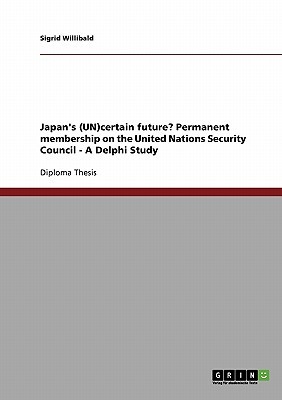
- We will send in 10–14 business days.
- Author: Sigrid Willibald
- Publisher: GRIN Verlag
- Year: 2007
- Pages: 156
- ISBN-10: 3638708942
- ISBN-13: 9783638708944
- Format: 14.8 x 21 x 0.9 cm, softcover
- Language: English
- SAVE -10% with code: EXTRA
Japan's (UN)certain future? Permanent membership on the United Nations Security Council - A Delphi Study (e-book) (used book) | bookbook.eu
Reviews
Description
Diploma Thesis from the year 2004 in the subject Politics - Topic: International Organisations, grade: Distinction, University of Vienna, language: English, abstract: 1. Introduction "We, the Japanese people, [...] desire to occupy an honored place in an international society striving for the preservation of peace, and the banishment of tyranny and slavery, oppression and intolerance for all time from the earth. [...] We [...] pledge our national honor to accomplish these high ideals and purposes with all our resources." (cit. in Hook et al. 2001:466) This excerpt from the Preamble to Japan's Constitution that came into effect from 3. May 1947 clearly reflects Japan's desire to regain a respectable position within the international arena. Defeated in battle and under allied occupation, it seemed as if Japan "would never again be able to play a major role on the world stage" (Linhart 1996:404). More than half a century later, circumstances have changed dramatically: not only has Japan recovered from its wartime devastation, it has also become a major economic power and risen to the status of key international player. Has Japan, in that sense, attained its goal and acquired an "honored place" in international society, as is stated in the Preamble to its Constitution? There are several means by which to assess Japan's place on an international stage. With regard to the above question, however, the United Nations Security Council lends itself to being a foremost measure. This can be ascribed to three rationales: firstly, the Security Council can be argued as epitomising what might indeed be called an "honored place" in international society. Not only is a permanent Security Council seat highly elitist, it is also a "scarce international resource" (Hurd, cit. in Drifte 2000:95) that enhances a country's prestige and confers it immense status. Secondly, the Security Council is endowed with the "primary responsibility for the maintenance of international peace and sec
- Author: Sigrid Willibald
- Publisher: GRIN Verlag
- Year: 2007
- Pages: 156
- ISBN-10: 3638708942
- ISBN-13: 9783638708944
- Format: 14.8 x 21 x 0.9 cm, softcover
- Language: English English
Diploma Thesis from the year 2004 in the subject Politics - Topic: International Organisations, grade: Distinction, University of Vienna, language: English, abstract: 1. Introduction "We, the Japanese people, [...] desire to occupy an honored place in an international society striving for the preservation of peace, and the banishment of tyranny and slavery, oppression and intolerance for all time from the earth. [...] We [...] pledge our national honor to accomplish these high ideals and purposes with all our resources." (cit. in Hook et al. 2001:466) This excerpt from the Preamble to Japan's Constitution that came into effect from 3. May 1947 clearly reflects Japan's desire to regain a respectable position within the international arena. Defeated in battle and under allied occupation, it seemed as if Japan "would never again be able to play a major role on the world stage" (Linhart 1996:404). More than half a century later, circumstances have changed dramatically: not only has Japan recovered from its wartime devastation, it has also become a major economic power and risen to the status of key international player. Has Japan, in that sense, attained its goal and acquired an "honored place" in international society, as is stated in the Preamble to its Constitution? There are several means by which to assess Japan's place on an international stage. With regard to the above question, however, the United Nations Security Council lends itself to being a foremost measure. This can be ascribed to three rationales: firstly, the Security Council can be argued as epitomising what might indeed be called an "honored place" in international society. Not only is a permanent Security Council seat highly elitist, it is also a "scarce international resource" (Hurd, cit. in Drifte 2000:95) that enhances a country's prestige and confers it immense status. Secondly, the Security Council is endowed with the "primary responsibility for the maintenance of international peace and sec


Reviews